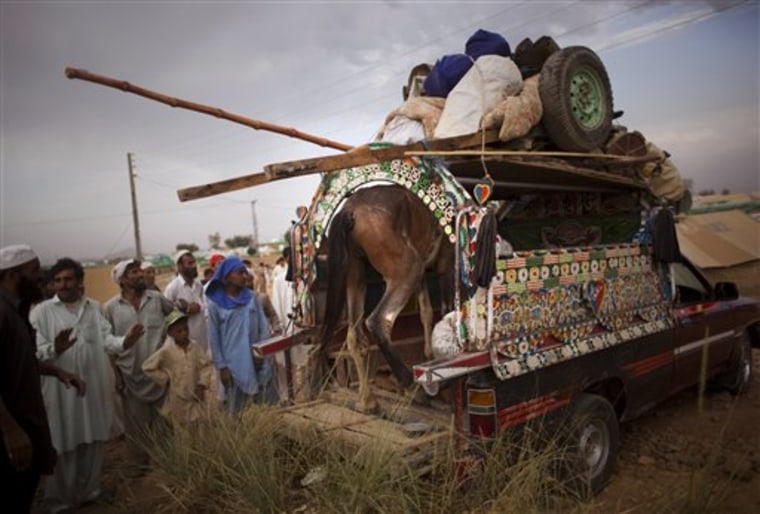A decision by Taliban militants to withdraw from a peace deal in a tribal region close to the Afghan border threatens to open a new front for the Pakistan army as it battles the insurgents in two other areas.
Militants close to the border are behind a spate of bombings that are destabilizing nuclear-armed Pakistan. They are also blamed for attacks on Western troops in Afghanistan, where violence is running at record levels eight years after the U.S.-led invasion.
The disintegration of the truce in North Waziristan was the latest failure of a government pact with local Taliban leaders. The agreements have been criticized abroad because they effectively cede space to the insurgents.
The current government offensive in the Swat Valley — which began after a peace deal there fell apart — and an artillery and air campaign in South Waziristan have been praised by the United States, which has been trying since the Sept. 11, 2001, attacks to get Islamabad to take military action against Taliban and al-Qaida fighters in the border region.
Militants in North Waziristan announced Monday that they had pulled out of a peace deal with the government dating back to early 2008, citing attacks by the army and missile strikes by the United States. The move followed a weekend ambush by insurgents on an army convoy in the region that killed at least 16 soldiers, among them three officers.
Army spokesman Maj. Gen. Athar Abbas vowed Tuesday to avenge the attack.
"There is now a new situation in North Waziristan," he said. "Lets see how we are going to handle this," he said, declining to elaborate.
A lawless, mountainous region
The border region is a lawless, mountainous region where the central government has little control.
Pakistan began its offensive in the Swat Valley region in late May after militants there advanced on the capital, violating the terms of the peace deal. The military claims to have killed more than 1,000 fighters and has retaken much of the district, but most of the some 2 million people who fled the fighting have yet to return.
This month, the army began bombing targets in South Waziristan, saying it was softening up the region for an offensive targeting Baitullah Mehsud, the leader of Pakistan's major Taliban faction who has been blamed for many of the county's most deadly suicide attacks in recent years.
The scrapping of the accord to the north adds to the difficulties facing the army.
"The group they are trying to neutralize has become bigger, as has the area they will need to contain them," said Shahzad Chaudhry, the former deputy head of the Pakistani air force and a security analyst. "The attempt was to try and reduce the size of the opposing forces, but now it seems the army have a bigger problem at hand. It will have to be a long-haul fight now."
Details of the peace deal had not been made public, but it had appeared to cause a reduction in attacks on Pakistani military targets in North Waziristan compared to other parts of the border region. But U.S. and NATO commanders in Afghanistan said the region was being used by fighters there as a safe haven.
U.S. missiles rallly insurgents
Since August, the United States has fired more than 40 missiles at suspected militant targets in the tribal regions in a sign of its frustration with Islamabad. The strikes have killed many militants but have also served as a rallying cry for the insurgents.
A spokesman for North Waziristan Taliban leader Hafiz Gul Bahadur cited those attacks when pulling out of the deal.
"This accord is being scrapped because of Pakistan's failure to stop the American drone attacks in North and South Waziristan," Ahmadullah Ahmadi told The Associated Press. "Since the army is attacking us in North and South Waziristan, we will also attack them."
The offensives against the militants have been broadly welcomed by most Pakistanis, but this support could waver as the campaign drags on. Pakistan has more than 100,000 troops in the region, but most are poorly trained for counterinsurgency.
The army offensive in the tribal region suffered another blow last week when gunmen assassinated Qari Zainuddin, a militant leader in South Waziristan who opposed Mehsud and was seen as close to the government. A Mehsud aide allegedly carried out the slaying.
Militants are 'perhaps better equipped'
The News, a leading English-language newspaper, said in an editorial that Sunday's ambush and the scrapping of the accord showed the tough fight ahead in the Waziristans, where the militants have had years to dig in and prepare their defenses.
"This is going to be no sweeping up of a few raggle-taggle remnants," it said. "This is going to be a hard-fought bitter battle against a force no less able, and perhaps better equipped, than our own."
Also Tuesday, a car bomb struck trucks taking supplies to Western troops in Afghanistan, killing four people in Pakistan's southwest, police said. No one claimed responsibility for the explosion in Baluchistan province, but militants have frequently targeted supply trucks for U.S. and NATO troops that travel through Pakistani territory.
